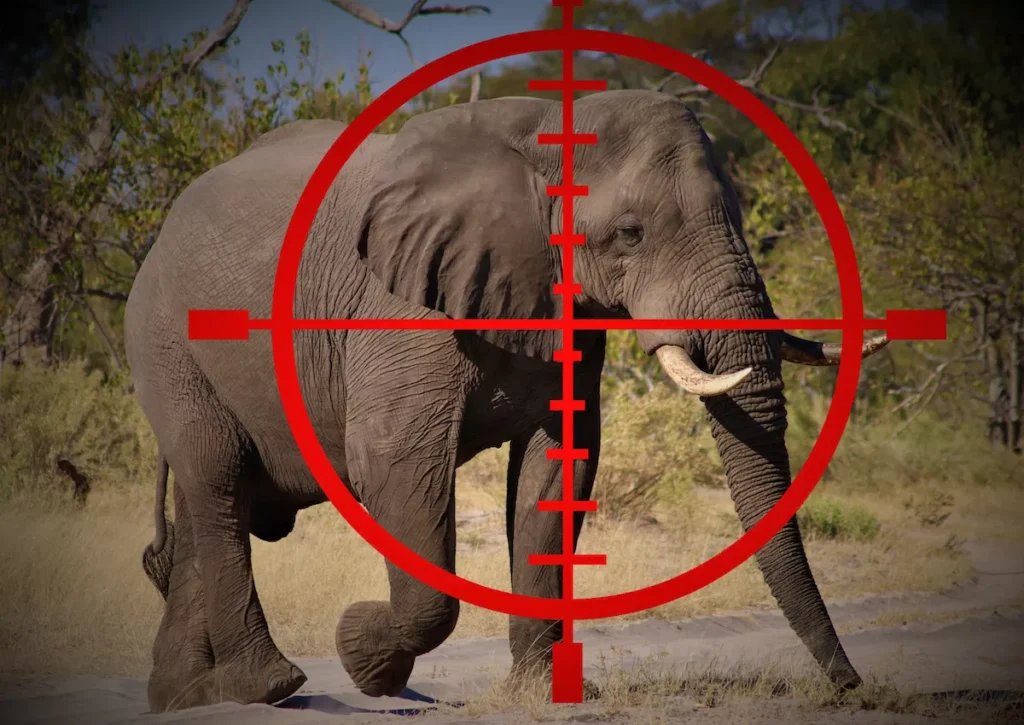Washington, DC – The U.S. Fish and Wildlife Service is embracing the discredited and unethical practice of trophy hunting of threatened and endangered species in its latest proposed rulemaking on elephant conservation, according to the Animal Wellness Action (AWA) and the Center for a Humane Economy (CHE). The groups are calling on the agency to bar any trophy imports of threatened and endangered species and embrace the same standard on “taking” under the Endangered Species Act of wildlife for trophies that applies to all domestically listed species. The United States does not allow the trophy hunting of Florida panthers, grizzly bears, or any listed species and that policy has been in place since enactment of the Endangered Species Act in 1973..

This action by the Biden Administration is yet one more retreat on animal welfare when it comes to wildlife regulations. Even Donald J. Trump, shortly after his inauguration in 2017, called elephant hunting “a horror show” and dramatically scaled back imports of sport-hunted trophies of elephants and other threatened and endangered species.
While the Proposed Rule is framed as providing additional safeguards to ensure protections for African elephants in range states, it embraces two enterprises long discredited by animal welfare advocates and many conservationists: the trophy hunting of these threatened species and their capture and import for exhibition.
“U.S. states and our federal government have the leading wildlife management programs in the world – with more rigorous enforcement and science-based approaches than other nations – and if we do not accept the idea of hunting threatened or endangered species in the U.S., why would we accept that practice for foreign-listed species under the ESA?,” asked Wayne Pacelle, president of Animal Wellness Action and the Center for a Humane Economy. “We would never allow the hunting of Florida panthers or whooping cranes in the United States just because some people were willing to pay to shoot them. We do not have a pay-to-slay policy for rare species in the United States, and we shouldn’t have that policy for foreign-listed species, either.”
Even with the standards described in the Proposed Rule, the FWS will continue to use a much laxer, revenue-based standard of conservation when approving the import of hunting trophies into the United States by Americans who kill threatened and endangered species overseas and return with their parts. The agency is issuing import permits after making cursory findings of “enhancement” of the species based on largely unsupported conclusions that payments to foreign wildlife authorities are beneficial to the overall health of the species. Ascending populations are not evidence of sound management practices.
“The disparate treatment of domestic and foreign-listed species when it comes to trophy hunting is unjustified,” stated Kate Schultz, senior attorney with the Center for a Humane Economy. “It is an act of faith, rather than a matter of sound science, to tie globe-trotting, commercial hunting to conservation outcomes.”
A 2020 report from the Committee on Natural Resources in the U.S. House of Representatives called out the long-standing allowance of granting import permits for sport-hunted trophies of threatened and endangered species. From 2005 to 2014, American trophy hunters imported parts of 32,500 animals killed overseas, including large numbers of African lions, African elephants, leopards, and rhinoceroses (all species now listed as threatened or endangered). The report cited studies that documented the substantial instances of corruption, quota violations, illegal hunting practices, bribery, and non-conservation spending that surrounds a “pay-to-play” strategy.
The United States rightly rallied the global community to save elephants from poaching for their tusks for ivory, urging Africans in elephant-occupied regions to forego short-term profits from the sale of ivory to preserve the species. “It is inconsistent for the United States to call on local Africans not to kill elephants for the ivory trade, but for the U.S. as a matter of national policy to give the go-ahead to wealthy American hunters to kill elephants and then to bring the ivory tusks back into our country,” added Pacelle. “Indeed, just like the poachers, trophy hunters covet the ivory of elephants.”
AWA and CHE will strongly encourage the FWS to issue a much more protective final rule than the one now being contemplated, including provisions forbidding trophy hunting imports of threatened and endangered species. Most African countries with elephants do not allow trophy hunting, so many range states themselves reject the strategy of random killing of bull elephants by trophy hunters as a conservation practice. What’s more, that practice of trophy hunting is not in play with protection of gorillas, chimpanzees, and other megafauna at risk in their range states.
The publishing of the Proposed Rule in the Federal Register on November 17, 2022 commences a 60-day comment period.

